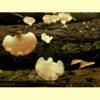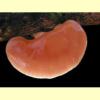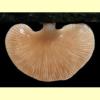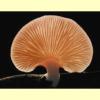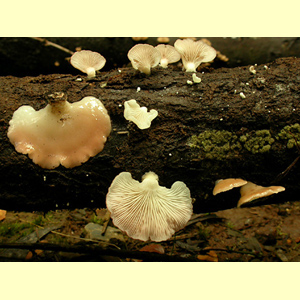
images/Panellus_longinquus/Panellus_longiquus.jpg
Small to medium agaric, growing on wood, with a white or cream spore print. Pileus typically pink, but it can be white or pale, or with darker brown or purple tones, viscid. Lamellae adnexed, adnate or subdecurrent. Stipe excentric, lateral or absent. Partial veil remnants absent. Spores hyaline, amyloid, smooth; germ pore absent. Cheilocystidia present or absent. Lamellar trama regular or interwoven. Pileipellis a cutis or a trichoderm. Clamp connections present.
Panellus ligulatus has a dry pileus and non-amyloid spores, while in
P. stipticus the pileus is pale brown rather than pink, and the surface is dry or not very viscid. In
Hohenbuehelia the pileus can be viscid, but it is brown or grey. In addition, spores are non-amyloid, and there are thick-walled cystidia in the hymenium. All other pleurotoid agarics (see
Pleurotus) lack amyloid spores, except
Lentinellus, where the lamellae edges are serrate and the spores are ornamented.
Panellus longinquus (Berk.) Singer,
Sydowia 5: 471 (1951).
Qld, N.S.W., Vic. and Tas.
Native forests. Prefers cool-temperate rainforest.
On wood.
Saprotrophic.
Corner, E.J.H. (1987), The agaric genus
Panellus Karst. (including
Dictyopanus Pat.) in Malaysia,
Gard. Bull. Singapore 39: 103–147. [
Description and
Microcharacters of
P. longinquus from Queensland]
Fuhrer, B. (2005), A Field Guide to Australian Fungi. Bloomings Books, Hawthorn. [Description and Illustration of P. longinquus (as Pleurotopsis)]
Fuhrer, B. & Robinson, R. (1992), Rainforest Fungi of Tasmania and South-east Australia. CSIRO Press, East Melbourne. [Illustration of P. longinquus]
Horak, E. (1980a), Fungi, Basidiomycetes. Agaricales y Gasteromycetes secotioides, Fl. Criptog. Tierra del Fuego 11(6): 1–524.[Description, Microcharacters and B&W Illustration of P. longinquus from South America]
Jin, J., Hughes, K.W. & Petersen, R.H. (2001), Phylogenetic relationships of Panellus (Agaricales) and related species based on morphology and ribosomal large subunit DNA sequences, Mycotaxon 79: 7–121.
Libonati-Barnes, S.D. & Redhead, S.A. (1984), Panellus longinquus subsp. pacificus a new west coast North American agaric associated with red alder, Mycotaxon 20: 205–212. [Description, B&W Illustration and Microcharacters of P. longinquus from North America]

